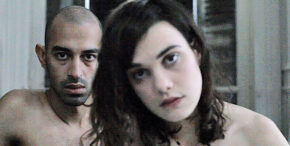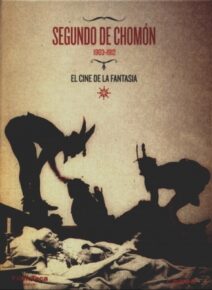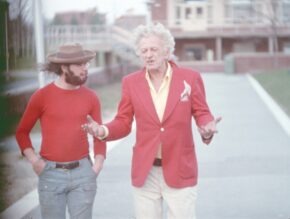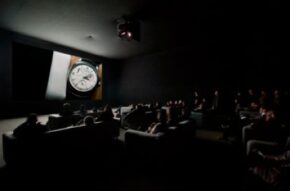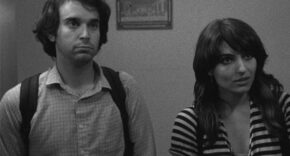CS48
Currency | Martha Marcy May Marlene (Sean Durkin, US)
By Andrew Tracy | 09/29/2011 | CS48, Currency, From Cinema Scope Magazine
By Andrew Tracy If “indie-ness” conveys a certain generic intimation unto itself, some of the most celebrated recent independent films have also strategically adopted broader generic tactics, usually related to violence. As sensation, whether shockingly enacted or tautly withheld, has started to become an ever more important element for independents to attract the necessary attention,…
Read More → Nana (Valérie Massadian, France)
By Jay Kuehner | 09/29/2011 | CS48, From Cinema Scope Magazine, Spotlight
By Jay Kuehner Consider it a triumph of the medium that soon we may not speak of “in-between-ness” or indeterminacy in cinema (let alone “slow” or “contemplative”), such attributes having become subsumed by and substantive of film itself, commonly deployed to a point of sufficiency. In which case a film such as Valérie Massadian’s Nana,…
Read More → Film/Art | Low Life Zombies
By Andrea Picard | 09/29/2011 | Columns, CS48, From Cinema Scope Magazine
By Andréa Picard “Two types of film: those that employ the resources of the theatre (actors, directors, etc…) and use the camera in order to reproduce; those that employ the resources of cinematography and use the camera to create.” —Robert Bresson, Notes sur le Cinématographe “Art is like a fire; it is born out of…
Read More → Global Discoveries on DVD | Subjects for Further Research
By Jonathan Rosenbaum | 09/28/2011 | Columns, CS48, From Cinema Scope Magazine
By Jonathan Rosenbaum 1. IL CINEMA RITROVATO DVD AWARDS 2011 Jurors: Lorenzo Codelli, Alexander Horwath, Mark McElhatten, Paolo Mereghetti, Jonathan Rosenbaum, Peter von Bagh. BEST DVD 2010 / 2011 Segundo de Chomón 1903-1912: El Cine de La Fantasia. (Filmoteca de Catalunya [ICIC]/Cameo Media s.l.) A production by Cameo and Filmoteca Catalunya. The first edition of…
Read More → CS 48 Editor’s Note
By Mark Peranson | 09/28/2011 | Columns, CS48, From Cinema Scope Magazine
Hurricane season in Toronto means the rush is on to cram in as many films as possible in a four-week period, the build-up to the cinematic smorgasbord that is the Toronto International Film Festival. One such period over a decade ago saw the founding of this magazine, with an issue devoted solely to previewing TIFF.…
Read More → It’s the Earth Not the Moon (Gonçalo Tocha, Portugal)
By Robert Koehler | 09/28/2011 | CS48, From Cinema Scope Magazine, Spotlight
By Robert Koehler The lure of islands, their fundamental thereness, their separation from, and fragile connections to, the rest of civilization, their existence as an ideal metonym for individual identity but also for the world as a whole—all these, and more, make islands powerful places for filmmakers to land upon. When they do, they’re hopefully…
Read More → Policeman (Nadav Lapid, Israel)
By Olivier Pere | 09/28/2011 | CS48, From Cinema Scope Magazine, Spotlight
By Olivier Père It’s been a long time since a first feature has displayed such masterly direction as Nadav Lapid’s Policeman (Hashoter), such a sense of connection to the films of Godard, Bresson, Fassbinder, Kubrick, and Haneke, and giving those more perceptive viewers such a conviction of witnessing the arrival of an outstanding filmmaker while…
Read More → Crazy Horse (Frederick Wiseman, France/US)
By Mark Peranson | 09/28/2011 | CS48, From Cinema Scope Magazine, Spotlight
By Mark Peranson Over the last decade, I’ve realized that Frederick Wiseman devotees are incapable of critical thinking when it comes to their master. They fail to see (or refuse to acknowledge) that in composing his career-long grand narrative analysis, Wiseman sometimes loses sight of the particularities of the institution under observation; at times, he’s…
Read More → A Dangerous Method (David Cronenberg, Canada/Germany)
By Richard Porton | 09/28/2011 | CS48, From Cinema Scope Magazine, Spotlight
By Richard Porton The title of Russell Jacoby’s 1983 polemic, The Repression of Psychoanalysis, suggests that the radical implications of the Freudian tradition have become muddled in an era where nothing seems more safely middle-class than a session on the couch with the shrink of one’s choice. In evoking a juncture at the turn of…
Read More → We Can’t Go Home Again: Nicholas Ray’s Film Maudit Restored
By Gabe Klinger | 09/28/2011 | CS48, Features, From Cinema Scope Magazine
By Gabe Klinger “We lived by night, shooting and editing our bigger than life experiences in a lonely place on dangerous ground.” —Tom Farrell “Bless the family that loves together…Bless the family that laughs and cries together… Together…”—“Bless the Family” by Norm Zamcheck, written for We Can’t Go Home Again Nicholas Ray, eternal auteurist pet…
Read More → Random Notes on a Projection of The Clock by Christian Marclay at the Los Angeles County Museum of Art, 4:32 pm, July 28, 2011-5:02 pm, July 29, 2011
By Thom Andersen | 09/28/2011 | CS48, Features, From Cinema Scope Magazine
By Thom Andersen 1. The Clock is certainly dumb: a 24-hour movie made entirely from other movies in which the depicted screen time corresponds precisely to the actual time of the screening with plenty of clock inserts and shots in which clocks appear, sometimes incidentally. I’m sure I’m not the first to ask, why didn’t…
Read More → Gravity’s Grayscale: Alex Ross Perry’s Cinema of Deaffirmation
By Michael Sicinski | 09/28/2011 | CS48, From Cinema Scope Magazine, Interviews
By Michael Sicinski One could make a long, sad list of everything wrong with American independent cinema today, but one of the worst things about so much of it is just how desperate it is to be liked. There’s an ugly tendency to simultaneously flatter an audience’s supposed good taste and breeding (“look at you,…
Read More → Nicolas Winding Refn and the Search for a Real Hero
By Robert Koehler | 09/28/2011 | CS48, From Cinema Scope Magazine, Interviews
By Robert Koehler “Hey, do you wanna see somethin’?”—Driver in Drive In the middle of Nicolas Winding Refn’s Drive, a film punctuated by extreme flourishes of violence and vengeance, there is a period of peace. It occurs when Driver (Ryan Gosling), a quietly contained guy who holds down three jobs—auto mechanic, movie stunt driver, and…
Read More → 


